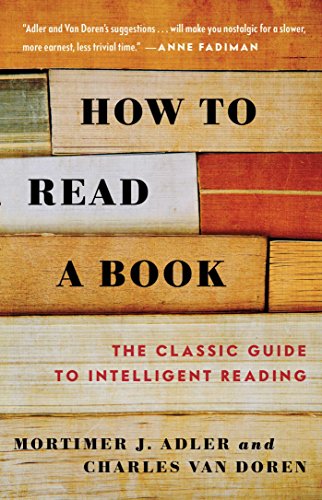How to Read a Book: The Classic Guide to Intelligent Reading (A Touchstone book)
amazon.com
How to Read a Book: The Classic Guide to Intelligent Reading (A Touchstone book)

History is chronotopic. Chronos is the Greek word for time, topos the Greek word for place. History always deals with things that existed or events that occurred on a particular date and in a particular place. The word “chronotopic” can remind you of that.
Important as reading titles is, it is not enough. The clearest titles in the world, the most explicit front matter, will not help you to classify a book unless you have the broad lines of classification already in your mind.
One reason why titles and prefaces are ignored by many readers is that they do not think it important to classify the book they are reading. They do not follow this first rule of analytical reading. If they tried to follow it, they would be grateful to the author for helping them. Obviously, the author thinks it is important for the reader to know
... See moreThe Importance of Classifying Books The first rule of analytical reading can be expressed as follows: RULE 1. YOU MUST KNOW WHAT KIND OF BOOK YOU ARE READING, AND YOU SHOULD KNOW THIS AS EARLY IN THE PROCESS AS POSSIBLE, PREFERABLY BEFORE YOU BEGIN TO READ.
We hope we have encouraged you by the things we have said in these pages. It is hard to learn to read well. Not only is reading, especially analytical reading, a very complex activity—much more complex than skiing—it is also much more of a mental activity.
There is a step beyond even that, however, and a truly expert reader can take it when he is reading several books syntopically. That is to make notes about the shape of the discussion—the discussion that is engaged in by all of the authors, even if unbeknownst to them. For reasons that will become clear in Part Four, we prefer to call such notes
... See moreThe questions answered by inspectional reading are: first, what kind of book is it? second, what is it about as a whole? and third, what is the structural order of the work whereby the author develops his conception or understanding of that general subject matter?
Good books are over your head; they would not be good for you if they were not. And books that are over your head weary you unless you can reach up to them and pull yourself up to their level. It is not the stretching that tires you, but the frustration of stretching unsuccessfully because you lack the skill to stretch effectively. To keep on
... See moreThe four questions stated above summarize the whole obligation of a reader. They apply to anything worth reading—a book or an article or even an advertisement. Inspectional reading tends to provide more accurate answers to the first two questions than to the last two, but it nevertheless helps with those also. An analytical reading of a book has
... See more